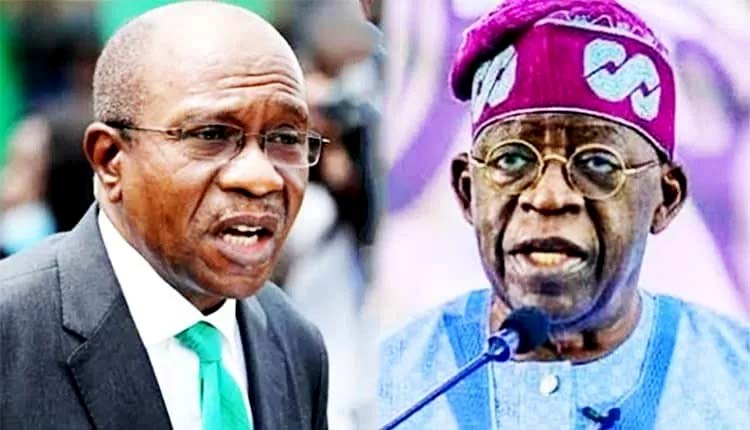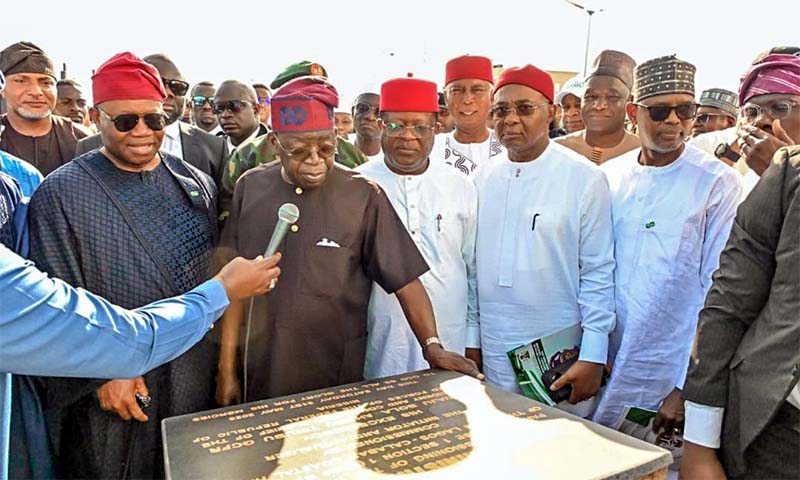“Plea bargain is counterproductive and an energy drink to corruption since it promotes the notion that a public office holder can steal N100 billion, be asked by the EFCC to pay just N8 or 9 billion, pocket the rest and go free”
Plea bargain is counterproductive and an energy drink to corruption since it promotes the notion that a public office holder can steal N100 billion, be asked by the EFCC to pay just N8 or 9 billion, pocket the rest and go free under a so-called plea bargain
Amid the ‘camera dodging’ antics of the suspended Governor of the central bank Godwin Emefiele at the federal high court Abuja during the resumed hearing of the alleged N6.9 billion fraud came another obnoxious kite of plea bargain talks between Emefiele and the federal government of Nigeria.
It must be stated here that plea bargain is not the best way out of Emefiele’s or any corruption case for that matter. Why opt for plea bargain when you have all the evidence to nail the suspect?
Plea bargain is looting in a different style, a scam and arguably, worse than money laundering.
The dubious concept of plea bargain is currently being applied at lightning speed by the economic and financial crimes commission (EFCC) to dispense off aggravated cases of money laundering and looting of the public treasury. This step by the EFCC is counter-productive and if not checked, will in the long run serve as a tool for corrupt public office holders to continue looting the nation’s lean resources.
If plea bargain is the way to fight corruption, what then is the role of the Nigerian judiciary, the economic and financial crimes commission (EFCC), the independent corrupt practices commission (ICPC), Nigeria police and other security agencies?
Do these agencies exist for the sole purpose of squeezing a little out of billions of Naira stolen by public office holders under a so-called ‘plea bargain?
Plea bargain sends the wrong signals to erring public office holders that one can steal as much as possible and turn around to buy his/her freedom by paying a percentage of his/her loot. The applicable rate is normally 10% of the loot.
Plea bargain encourages corruption and abuse of trust by public office holders, undermines the fight against corruption and gives a near-blank cheque to government officials to fleece the state.
The misapplication of plea bargain gets its source mainly from section 174 of the constitution of the federal republic of Nigeria 1999 (as altered) and section 14(2) of the economic and financial crimes commission (EFCC) act 2004. It should be noted that these laws do not expressly legalise plea bargain but are being used in a ‘scapegoating syndrome’ to justify plea bargain.
The relevant section 14(2) of EFCC act 2004 is clear, explicit and unambiguous that:
Subject to the provision of Section 174 of the Constitution of the Federal Republic of Nigeria 1999 (which relates to the power of the Attorney-General of the Federation to institute, continue or discontinue criminal proceedings against any persons in any court of law), the Commission may compound any offence punishable under this Act by accepting such sums of money as it thinks fit, not exceeding the amount of the maximum fine to which that person would have been liable if he had been convicted of that offence
First of all, it can easily be interpreted from the relevant section 14(2) of the EFCC act 2004 that there is no mention of plea bargain in this section or the entire EFCC act. The EFCC merely uses this window under the term ‘compound any offence’ as stated therein to turn the entire EFCC act on its head to dubiously deploy the concept of plea bargain.
Compounding of offences as stated in section 14(2) is not the same thing as plea bargain. Moreover, the section is clear that the amount to be accepted from suspected looters by the EFCC under plea bargain has to be in line with the amount such suspects would have been liable to, if convicted by the courts.
The question here is: how does the EFCC arrive at the figures it agrees to with suspects under a plea bargain?
Under the current system of plea bargain, the EFCC normally agrees on about 10% of the looted funds with suspects, sometimes even less. The 10% normal plea bargain cut-off mark employed by the EFCC runs counter to section 14(2) of the EFCC act 2004 which is clear that under the powers of the EFCC to compound any offence (which the EFCC wrongly interprets as the go-ahead for plea bargain), the commission must accept any amount not exceeding the amount such suspects would have been charged if he/she is to be convicted in a court of law. It follows that there is a correlation between the amount to be accepted by the EFCC under a plea bargain and the likely fine that a court of competent jurisdiction would have slammed on the ‘looter’ upon conviction. What about the possible jail term upon conviction? How could plea bargain serve as a replacement for a jail term?
Clearly, the nation is grossly being shortchanged under plea bargain especially when coupled with the allegation that EFCC officials take 10% of the proceeds of plea bargain as ‘consultancy services.
Under the so-called plea bargain, a suspect who allegedly stole N70 billion is asked by the EFCC ‘how much can you offer? Such a suspect may wish to simply offer as little as N8 billion and get away with the N62 billion balance of his loot. An example is that of the former Zamfara state governor Bello Matawalle who was accused of stealing N70 billion by the EFCC (shockingly, he is now a minister of the federal republic of Nigeria). It was reported that the suspended former EFCC chairman Abdulrasheed Bawa allegedly went to Matawalle, flashed Matawalle’s dossier/evidence of the alleged N70 billion loot before him (Matawalle) and asked ‘how much can you offer under plea bargain?
This is certainly not the way to fight corruption. What stops the EFCC from arresting and prosecuting any suspects no matter how highly placed? Does a former governor enjoy any carryover immunity?
Secondly, section 174 of the constitution 1999 (as amended) didn’t legalise plea bargain. In fact, the constitution doesn’t give the AGF, the EFCC or the courts the powers to enter Into any plea bargain. The constitution is merely stating the powers of the attorney-general of the federation (AGF) to institute, continue or discontinue any cases against any person in a court of law.
Section 174 (1) is clear, explicit and unambiguous that:
*The Attorney-General of the Federation shall have power –
(a) to institute and undertake criminal proceedings against any person before any court of law in Nigeria, other than a court-martial, in respect of any offence created by or under any Act of the National Assembly;
(b) to take over and continue any such criminal proceedings that may have been instituted by any other authority or person; and
(c) to discontinue at any stage before judgement is delivered any such criminal proceedings instituted or undertaken by him or any other authority or person.
(2) The powers conferred upon the Attorney-General of the Federation under subsection (1) of this section may be exercised by him in person or through officers of his department.
(3) In exercising his powers under this section, the Attorney-General of the Federation shall have regard to the public interest, the interest of justice and the need to prevent abuse of legal process*
It is very clear from the provisions of section 174 of the CFRN 1999 (as amended) that the powers granted the attorney general of the federation are only regarding instituting criminal proceedings, continuing or discontinuing cases against any person. The AGF does not enjoy any powers under the constitution to engage in plea bargain with any suspect.
The EFCC being considered ‘technically’ as a parastatal under the office of the attorney-general of the federation (AGF) often relies on legal support from the office of the AGF to negotiate a so-called plea bargain with suspected looters of the nation’s lean resources. The two MDAs -the EFCC and the office of the AGF-are into an alliance of convenience to use plea bargain and get a ‘soft-landing’ for suspected corrupt public office holders especially former state governors. Even alleged mega corruption scandals such as that of the former accountant general of the federation Ahmed Idris, accused of defrauding Nigeria of over N100 billion is reported to be on its way to being concluded through the so-called plea bargain. If the EFCC uses plea bargain and asks a suspect who stole N100 billion ‘what can you offer’ and the suspect replies ‘N10 billion’ the EFCC may simply ask him to ‘go ahead and pay. You are free but sin no more’
What example is the EFCC giving to other public office holders?
The administration of criminal justice act ACJA 2015 in section 270 (2), allows for a plea bargain provided certain conditions are met.
Under the provisions of the ACJA 2015, the prosecution can enter into a plea bargain with the defendant or his/her representatives provided that the evidence of the prosecution is insufficient to prove the offence charged beyond any reasonable doubt. The relevant section 270(2) is clear, explicit and unambiguous that:
ACJA 270(2):
The prosecution may enter into plea bargaining with the defendant, with the consent of the victim or his representative during or after the presentation of the evidence of the prosecution, but before the presentation of the evidence of the defense, provided that all the following conditions are present: (a) the evidence of the prosecution is insufficient to prove the offence charged beyond reasonable doubt; (b) where the defendant has agreed to return the proceeds of the crime or make restitution to the victim or his representative; or (c) where the defendant, in a case of conspiracy, has fully cooperated with the investigation and prosecution of the crime by providing relevant information for the successful prosecution of other offenders
It is clear that 270(2)(a) is often flouted by the EFCC because in most if not all cases, the EFCC always confirms that it has sufficient evidence to take the suspect to court and get them convicted. The question arises that since the EFCC always says it has sufficient evidence to nail the suspect, why then does the commission goes into a plea bargain?
Some proponents of plea bargain argue that going into plea bargain is justifiable because the Nigerian justice system is weak and cannot lead to conviction.
These proponents believe that the endless delays, bribery and corruption linked to judges make it imperative to apply plea bargain and ‘get something out’ from the suspects instead of losing everything.
Clearly, Nigeria’s justice system is extremely weak but the way out is to reform it and not to deploy plea bargain as an option. Come to think about it, the high profile suspects mostly former state governors have stolen enough money to easily bribe judges and ensure that the judicial process doesn’t take its full course.
Without doubt, the nation’s justice system as currently designed cannot fight corruption hence the need to think out of the box in the fight against corruption. In reforming the justice system to fight corruption, the federal government should:
1. Set up special anti-corruption COURTS
2. Enact special anti-corruption LAWS.
3. Appoint special anti-corruption JUDGES.
In conclusion, it is imperative that the newly sworn in Tinubu administration criminalises the application of plea bargain by the EFCC and other anti-corruption agencies because of its potentials to promote corruption in Nigeria. There is the possibility that plea bargain could destroy any gains made so far made in the fight against corruption.






